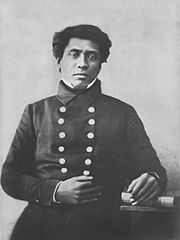Timothy Haalilio
| Haʻalilio | |
|---|---|
 |
|
| Member of the House of Nobles | |
|
In office 1842–1844 |
|
| Monarch | Kamehameha III |
| Kingdom of Hawaii Envoy to the United States, France and Great Britain | |
|
In office April 8, 1842 – December 3, 1844 |
|
| Monarch | Kamehameha III |
| Personal details | |
| Born | c. 1808 Oahu, Kingdom of Hawaii |
| Died | December 3, 1844 (aged 35–36) New York, United States |
| Resting place | Pohukaina or Kawaiahaʻo Cemetery |
| Nationality | Kingdom of Hawaii |
| Spouse(s) | Hana Hupa Haʻalilio |
| Alma mater | Lahainaluna School |
| Occupation | Royal Secretary, Diplomat, Politician |
| Religion | Congregationalism |
Timoteo or Timothy Kamalehua Haʻalilio (1808–1844) was a royal secretary and first diplomat of the Kingdom of Hawaii. He is best known for helping Hawaii in gaining recognization from Britain, France, and the United States as an independent sovereign nation.
Haʻalilio was born early in the 19th century, probably 1808. He was the son Koeleele (or Koelele), and his wife Kipa, in some accounts Eseta (Esther) Kipa. He was the half-brother of Levi Haʻalelea, who later became a husband of Princess Kekauōnohi. He was of the aliʻi class or Hawaiian nobility. He was included in the first English school set up by Hiram Bingham I in Honolulu around April 1821. In 1823 William Richards joined the mission, and became a teacher and friend for the rest of his life. After learning of the death of King Kamehameha II in 1825, Haʻalilio was selected to be the royal secretary of King Kamehameha III. Jean Baptiste Rives who had served as Kamehameha II's secretary had been accused of mismanagement of funds and never returned to Hawaii. He took the Christian name Timothy, which was "Timoteo" in the Hawaiian language spelling.
On June 7, 1826, he married Hana Hopua (Hooper in some sources), the daughter of Hopua and Polunu. The couple had no children and his wife outlived him and inherited some lands in the Great Mahele in 1848.
In 1831 the Lahainaluna School was founded, and he continued his education there. In July 1839 he was offered as a hostage during the French Incident. Captain Cyrille Pierre Théodore Laplace described him as:
"The king's secretary and one of his favorites was a handsome young man of frank, pleasant countenance and good manners; he wore European dress and spoke English quite well."
...
Wikipedia
